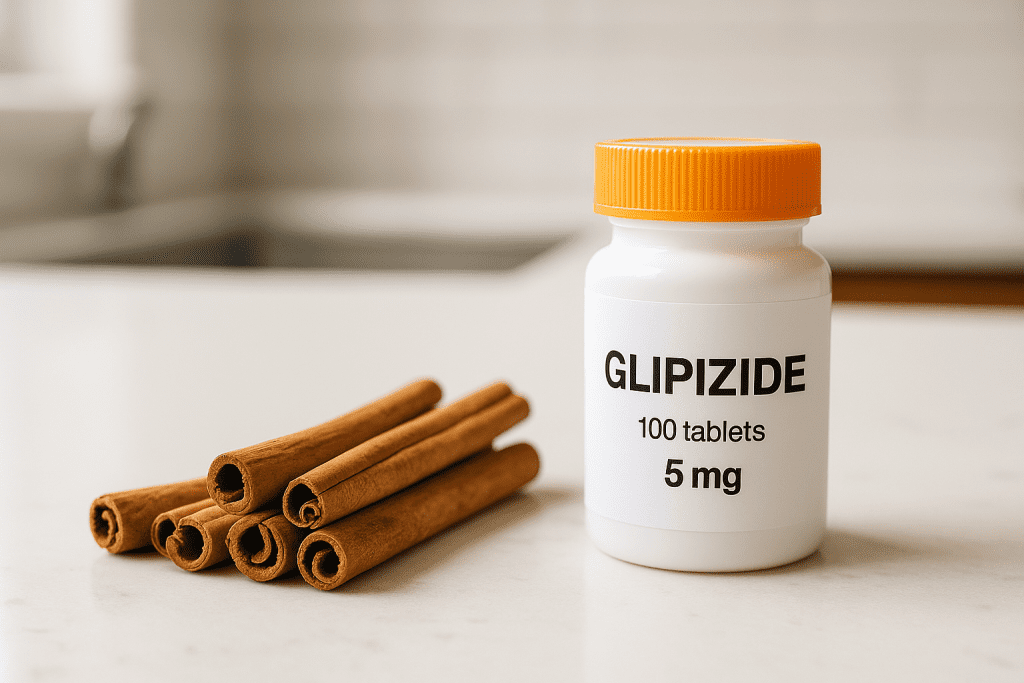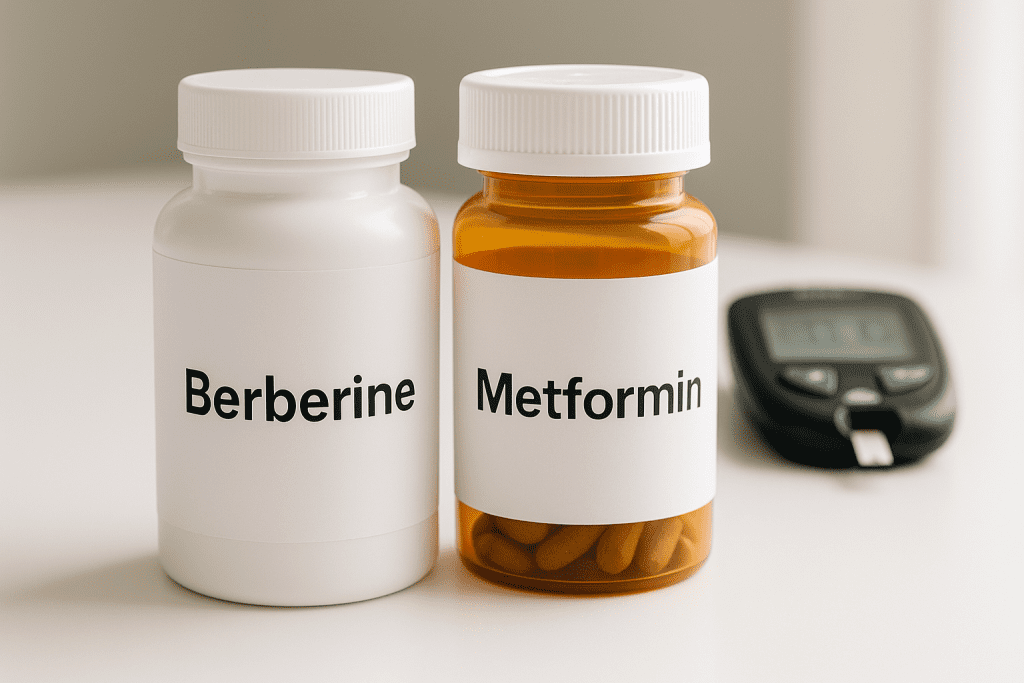Can herbal supplements help manage diabetes – or do they pose serious risks when mixed with medication? This article breaks down the science behind popular herbal remedies like cinnamon, bitter melon, and berberine, examining both their blood sugar benefits and their potential to dangerously interact with drugs like metformin or glipizide. If you’re considering a natural supplement alongside your diabetes treatment, understanding these risks is essential. We’ll cover the latest evidence, safety tips, and how to talk to your doctor about supplement use.
Summary / Quick Answer
Here’s what you need to know if you’re combining supplements with diabetes medications:
- Cinnamon: May lower blood sugar slightly, but risks hypoglycemia with drugs like glipizide
- Bitter Melon: Strong glucose-lowering effects – can dangerously amplify insulin or metformin
- Berberine: Promising natural alternative, but can alter metformin levels in the body
- General Rule: Supplements may help, but always require medical supervision
Understanding the diabetes drug herbal risk is critical, especially when seeking metformin natural supplement synergy or managing glipizide supplement conflict.
Cinnamon and Diabetes Drugs: Mild Help, Moderate Risk
Cinnamon has long been touted as a natural remedy for type 2 diabetes. While some small studies show modest improvements in fasting glucose and insulin sensitivity, others find no measurable benefit.

What the Research Says
- A recent meta-analysis found cinnamon may reduce blood sugar and HbA1c
- But another clinical trial showed no effect after 60 days of daily cinnamon use
- The American Diabetes Association does not recommend cinnamon for blood sugar control
How It Interacts With Medications
Cinnamon can enhance the effects of medications like insulin or glipizide, increasing the risk of hypoglycemia. According to Drugs.com, cinnamon may interact with sulfonylureas like glipizide by further lowering glucose levels.
Key Takeaways
| Risk Level | Moderate |
|---|---|
| Common Interactions | Glipizide, insulin, metformin |
| Symptoms to Watch | Dizziness, fatigue, sweating, confusion |
Cinnamon may be tempting as a “natural” solution, but its inconsistent effects and potential for drug conflict mean it should never replace prescribed treatments. Consult your doctor before use.
Bitter Melon: Natural Power With Strong Drug Conflicts
Bitter melon (Momordica charantia) is widely used in traditional medicine for its blood sugar-lowering effects – but the strength of those effects creates significant interaction risks with diabetes medications.
How It Works
- Stimulates GLP-1, enhances insulin release
- Mimics insulin activity
- Slows glucose absorption in the gut
These mechanisms can combine dangerously with drugs like insulin, metformin, and sulfonylureas.
Risky Interactions
Bitter melon may lead to serious complications when combined with:
- Insulin: Hypoglycemic coma has been reported
- Metformin: May enhance its glucose-lowering effect too strongly
- Glipizide and other sulfonylureas: Increases the likelihood of blood sugar crashes
Even children have experienced seizures and coma after consuming bitter melon. And in adults, cases of liver enzyme elevation and neurological symptoms have been documented.
Visual Summary
| Drug | Risk When Combined with Bitter Melon |
| Insulin | Very High – additive hypoglycemia |
| Metformin | High – may require dose adjustment |
| Glipizide | High – dangerous synergy risk |
For those considering bitter melon, extreme caution is warranted. It’s not a supplement to try casually.
Berberine and Metformin: A Promising Yet Potent Pair
Berberine, an alkaloid from plants like barberry, has shown real promise in managing type 2 diabetes. Multiple studies suggest its blood sugar-lowering effects may rival those of metformin.

Evidence of Effectiveness
- Improves insulin sensitivity
- Enhances glucose metabolism in the liver
- Lowers fasting glucose by up to 30%, according to clinical reviews
Benefits – But Not Without Caution
The synergy between berberine and metformin has gained attention. In fact, some trials suggest the combination may allow for dose reductions of both – potentially minimizing side effects.
However, this metformin natural supplement synergy isn’t without complications:
- Berberine can alter metformin’s absorption and metabolism
- It may increase the effects – and side effects – of both
One concern is gastrointestinal issues, including diarrhea from magnesium and metformin combination, which may be worsened by berberine’s poor bioavailability.
Table: Pros and Cons of Berberine
| Pros | Cons |
| Comparable to metformin | Poor absorption |
| May reduce required drug dose | Not suitable during pregnancy/liver disease |
| Multifaceted glucose control | Drug interaction potential |
Berberine shows real potential – but only with careful planning and physician oversight.
What Experts Say About Herbs + Diabetes Drugs
Medical consensus remains clear: herbal supplements should never be viewed as replacements for diabetes medications. But under supervision, they may serve as useful complements.
Trusted Guidance from Medical Bodies
- ADA: No benefit from supplements unless deficiency exists
- NCCIH: No strong evidence herbs control diabetes or complications
- Endocrinologists: Warn against self-prescribing without lab monitoring
Supplement Safety Tips
| Safe Use Tips | Details |
| Talk to your provider | Always disclose supplements to your doctor |
| Start slow | Begin with low doses, monitor effects |
| Choose quality | Look for NSF, USP, or ConsumerLab certification |
| Watch for drug conflicts | Especially with insulin, sulfonylureas, and metformin |
Unsafe combinations can lead to medical emergencies like fainting or seizures – especially when people mix herbs with glucose-lowering drugs without supervision.
If you’re also taking medications like ACE inhibitors, be cautious about potassium supplements and ACE inhibitor dangers, as these can cause electrolyte imbalances.
Conclusion
Mixing diabetes medications with herbal supplements is not a casual decision. Cinnamon, bitter melon, and berberine all offer potential benefits for blood sugar control – but they also carry clear interaction risks.
- Cinnamon has a moderate effect, but may cause low blood sugar when paired with glipizide.
- Bitter melon is potent, but risky alongside insulin or metformin.
- Berberine looks promising, especially with metformin, but only with oversight.
Always speak with a healthcare provider before starting a supplement. Monitor your blood sugar closely and watch for signs of low blood sugar, especially in the first few days.
Explore more:

